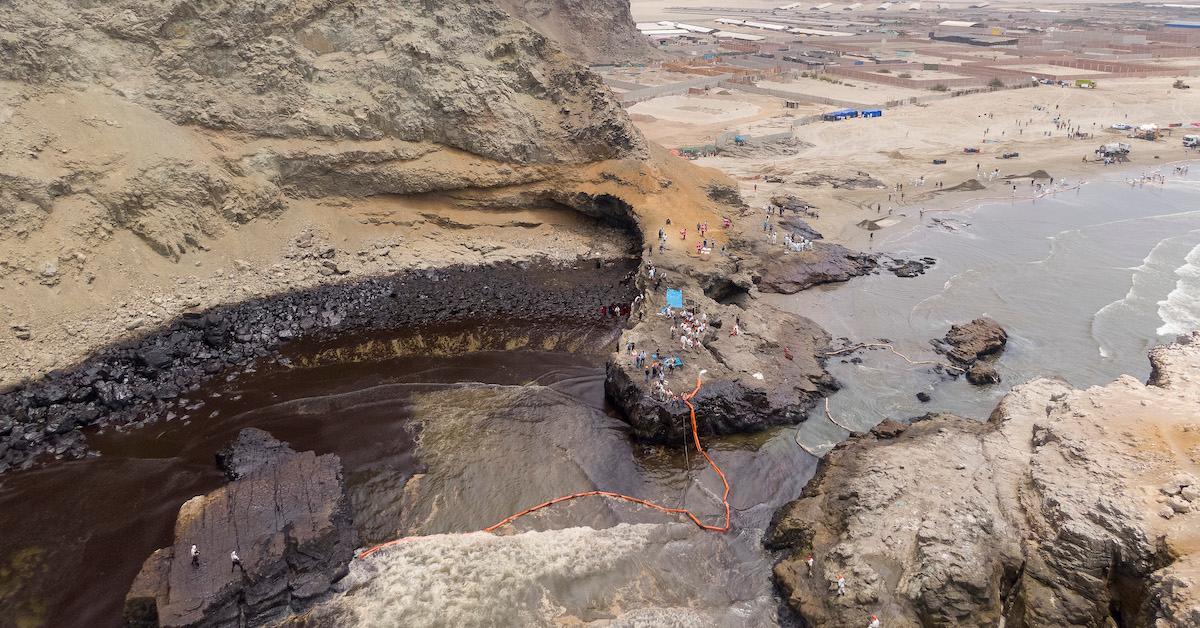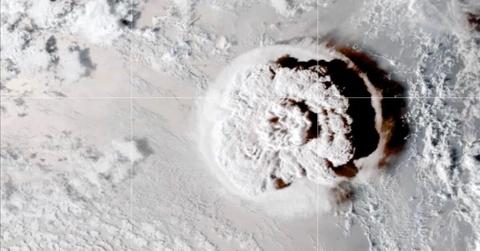How an Underwater Volcano Eruption in Tonga Is Contributing to the Climate Crisis
Published Aug. 5 2022, 12:26 p.m. ET
An underwater volcano’s recent eruption was so intense that it set off a tsunami, blasted massive amounts of water vapor into the Earth’s stratosphere, affected the global average temperature, and could actually contribute to depletion of the ozone layer.
And six months later, researchers are still finding out more about the Tonga volcano eruption, thanks to a new study. Here’s what we know about the powerful volcanic event.
An undersea Tonga volcano eruption spread far and wide.
On January 15, 2022, the Hunga Tonga-Hunga Ha’apai volcano, a submarine volcano located in the South Pacific, erupted. And this wasn’t your average volcanic eruption — according to the NASA Jet Propulsion Laboratory (JPL), the underwater eruption caused volcanic ash to cover the Polynesian island nation Tonga.
It also set off a huge tsunami, and the tsunami's large waves hit an oil tanker near Lima, Peru, and the tanker spilled 264,000 gallons of crude oil along the country's coastline, as reported by Smithsonian Magazine.
The volcano's eruption also triggered a sonic boom that “circled the globe twice.” People far and wide reported hearing the boom, in places including Alaska, Cook Islands, Fiji, New Zealand, Samoa, and Vanuatu, according to the Smithsonian.

Aerial view as Repsol employees work on the clean-up of an oil spill at Cavero beach on January 20, 2022 in Ventanilla, Peru. Waves attributed to the eruption of underwater volcano Hunga-Tonga-Hunga-Ha’apai in Tonga produced an oil spill in the coast of Lima.
The Tonga volcano’s effect on climate change:
Additionally, the Hunga Tonga-Hunga Ha’apai volcano emitted an unfathomable amount of water vapor (enough to fill over 58,000 Olympic swimming pools) into the planet’s stratosphere, which JPL says could temporarily impact the global average temperature of Earth; magnify specific chemical reactions that might temporarily exacerbate ozone layer depletion; and affect surface temperatures.
These new findings came this summer as part of a study published in the journal Geophysical Research Letters by JPL.
The study also found that while the amount of sulfur dioxide (SO2) and hydrochloric acid (HCl) set off by the volcano is commensurate to what other volcanoes have set off in the past, the mass amount of water has never really been seen before. In fact, the study’s authors believe that this extra stratospheric water concentration could persist for years, impact the chemistry of the stratosphere, and contribute to warming of the Earth’s surface.
The researchers measured the effects of the eruption using the Microwave Limb Sounder on NASA's Aura satellite. Based on these measurements, they estimated that the water vapor emitted in the explosion equals about the same amount of water vapor as 10 percent the stratosphere’s typical amount of water vapor.
And, interestingly, “Unlike previous strong eruptions, this event may not cool the surface, but rather it could potentially warm the surface due to the excess water vapor,” the study noted.
“We’ve never seen anything like it,” JPL atmospheric scientist and lead author of the study, Luis Millán, said in a statement.
So with this volcano potentially affecting the climate, does climate change at all affect volcanoes? According to a study published by Cambridge University in 2021, human activity does not cause volcanoes to erupt; however, human activity can impact the severity of volcanic eruptions, as a warmer atmosphere can cause volcanic material to move more quickly, and ash plumes and gas to rise higher.
What was the Tonga volcano eruption’s death toll?
As BBC News reported days after the eruption, the Tonga volcano eruption caused three deaths: two Tonga residents and one British woman. Additionally, Reuters reported that high waves on Peru beaches following the volcano killed two people in Peru.
